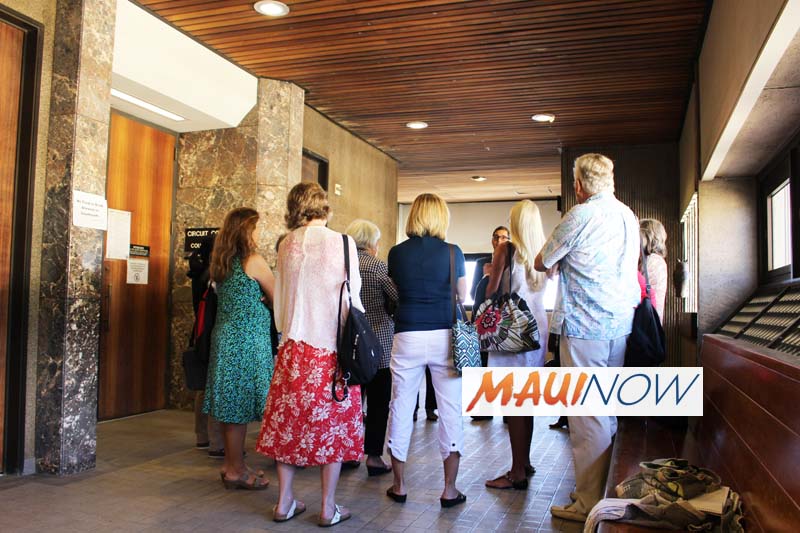Maui Judge Rules Against Challenge to Liquor Commission
Maui Judge Rhonda Loo today ruled against plaintiffs in a lawsuit that challenged the handling of rule changes made by the Liquor Control Commission.

Maui Judge Rhonda Loo today ruled against plaintiffs in a lawsuit that challenged the handling of rule changes made by the Liquor Control Commission. PC: Wendy Osher 8.8.17
The lawsuit was filed in May by the Committee for Responsible Liquor Control and Kīhei resident Madge Schaefer after rule changes were implemented relating to the 24-hour sale of liquor at retail establishments and changing the 12 establishment limit on hostess bars.
Although the rules were ultimately reversed following public opposition, the lawsuit remained in place as plaintiffs sought to address issues over proper notification and transparency.
“We’re obviously disappointed by the ruling,” said attorney for the plaintiff, Lance D Collins in an interview with Maui Now at the Wailuku courthouse this morning. “We do believe that Loo has erred, and we do plan to appeal.”
Collins continued saying, “The express language of Chapter 92 requires that the commission include on its agendas all of the pertinent information related to rule changes, and they did not do that in the February agenda; although they are now doing it in their July and August agenda.”
Schaefer, a plaintiff in the lawsuit also expressed disappointment in today’s decision. “The most important thing today is that the public be advised when a government agency is going to take an action–especially when it has such dramatic affects, like what the Liquor Commission did–that the public be able to discern that by looking at an agenda, and that wasn’t the case.”
The lawsuit alleged that the Liquor Commission violated both the Sunshine Law and the Hawai’i Administrative Procedure Act “by failing to give the public proper notice that they were going to take action,” on what the plaintiffs called, “radical policy changes.”
“The public’s right to participate in government is very important to me and that’s why I decided to get involved with this. It’s the first time that I’ve ever done anything like this, and I’m disappointed that we didn’t win, but it’s just a hurdle,” said Schaefer.
The ruling also comes ahead of a Wednesday meeting in which the Liquor Commission is expected to discuss rules relating to single-event licenses for non-profits.
“I think if the nine member Liquor Commissions who are members of our community, truly understood that the impact of all of their decision making that has been going on, the new requirements for fingerprinting of volunteer board members–for requiring them to turn in their Social Security numbers to the Liquor Department–are very unnecessary in today’s realm of what non-profits do,” said Maui resident Mahina Martin who successfully rallied for the repeal of a law that had allowed retailers to sell liquor around the clock.
“At tomorrow’s Liquor Commission meeting, there’s going to be an item that will open up the opportunity for non-profits to make their voices heard. And in response to the Liquor Department’s new rules that are in fact crippling non-profits and handicapping to them to the point where they’re cancelling events, using tens of thousands of dollars, and at the end of the day, those funds, those dollars go towards providing services to our community,” said Martin.
Although the court has determined that the Liquor Department is doing what they do to all applicants, Martin said that to throw all the non-profits into that one category is “unfortunate.”
“Many of us want to understand why is this necessary,” said Martin. “Why is the Liquor Department doing this to our community; and why are our non-profit board volunteers being required to turn in their fingerprints so that they can volunteer to help a needy non-profit?”
According to Martin, the rule is new in terms of its enforcement. “While the Liquor Department says it’s enforcing a state law, the State Attorney General has said it’s optional. No other county in the state of Hawaiʻi requires this of non-profits,” said Martin, ” and not ever, in the history of Maui County as a government, has this ever been applied.”
Schaefer called it’s “ridiculous,” saying, “I’m very concerned about what the Liquor Commission is going to do to the non-profits. They work so hard. They have volunteers.” To be put through a criminal background check, she said, “makes no sense to me at all.”
Going forward, Martin said, “The result from today’s court hearing gave us a clear opportunity for our Maui County non-profits to rally together and make their point to the Liquor Commission. It was disappointing, but it’s definitely a next step opportunity for us. I think that hearing that their attorney will appeal is going to be something to look forward to as well.”










